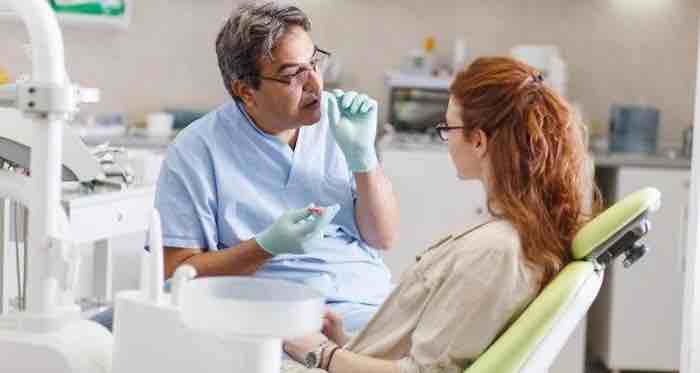
A trip to the dentist or orthodontist usually instills a sense of dread in most patients, and that's before the exam even begins. Add to that the fear of oral surgery with a painful recovery, and many people will avoid these visits at all costs. Now, one group reports a pre-clinical study in ACS Nano showing that they could potentially reduce pain and recovery time with the aid of specialized nanotechnology.
Every year, 5 million people undergo orthodontic procedures in the U.S., according to the American Association of Orthodontists. In some cases, teeth are misaligned to such an extent that surgery is required to cut collagen fibers under the gums before braces are put on the teeth. But patients often choose not to undergo the procedure because it's invasive and can be painful. Scientists recently have turned to nanotechnologies to target therapeutics to specific locations. For example, previous studies have shown some success in using liposomes, which are empty nanoscale vesicles, for drug delivery. Collagenase enzymes could potentially remodel the fibers connecting teeth to bone in the mouth without using a scalpel, but so far, delivering enzymes with liposomes has been challenging. Avi Schroeder and colleagues wanted to develop liposomes that could deliver collagenase enzymes to perform targeted nanosurgery in the mouth.
The team developed liposomal nanoparticles that contained collagenase and performed tests with them in rats. When the liposomes were placed under the gums, the collagenase diffused out of the particles and was activated by calcium naturally found in the mouth. The collagenase weakened the collagen fibers, making it easier to shift the teeth afterward with braces. Compared to conventional surgery, the collagenase treatment helped move the teeth three times faster. All of the rats lost some weight after the surgery, just as humans typically do. But unlike the other rats, the ones treated with collagenase quickly rebounded to their normal healthy weight, which the researchers say suggests they were not in pain.
The authors acknowledge funding from the European Research Council, Israel Ministry of Science Technology and Space, Israel Ministry of Economy, Israel Science Foundation, Israel Cancer Association, German-Israeli Foundation for Scientific Research and Development, European Union and the Mallat Family Foundation.
"
Proteolytic Nanoparticles Replace a Surgical Blade by Controllably Remodeling the Oral Connective Tissue"
American Chemical Society——
Bio and Archives
American Chemical Society, ACS is a congressionally chartered independent membership organization which represents professionals at all degree levels and in all fields of chemistry and sciences that involve chemistry.
 A trip to the dentist or orthodontist usually instills a sense of dread in most patients, and that's before the exam even begins. Add to that the fear of oral surgery with a painful recovery, and many people will avoid these visits at all costs. Now, one group reports a pre-clinical study in ACS Nano showing that they could potentially reduce pain and recovery time with the aid of specialized nanotechnology.
A trip to the dentist or orthodontist usually instills a sense of dread in most patients, and that's before the exam even begins. Add to that the fear of oral surgery with a painful recovery, and many people will avoid these visits at all costs. Now, one group reports a pre-clinical study in ACS Nano showing that they could potentially reduce pain and recovery time with the aid of specialized nanotechnology.